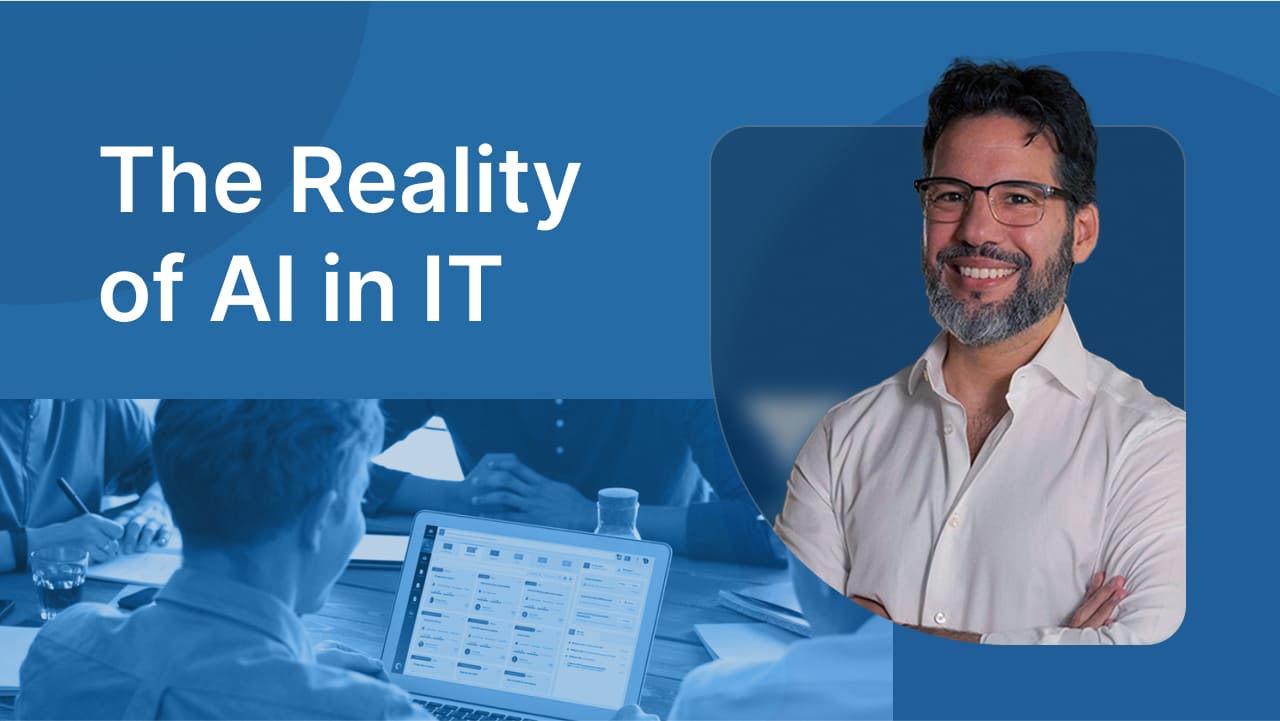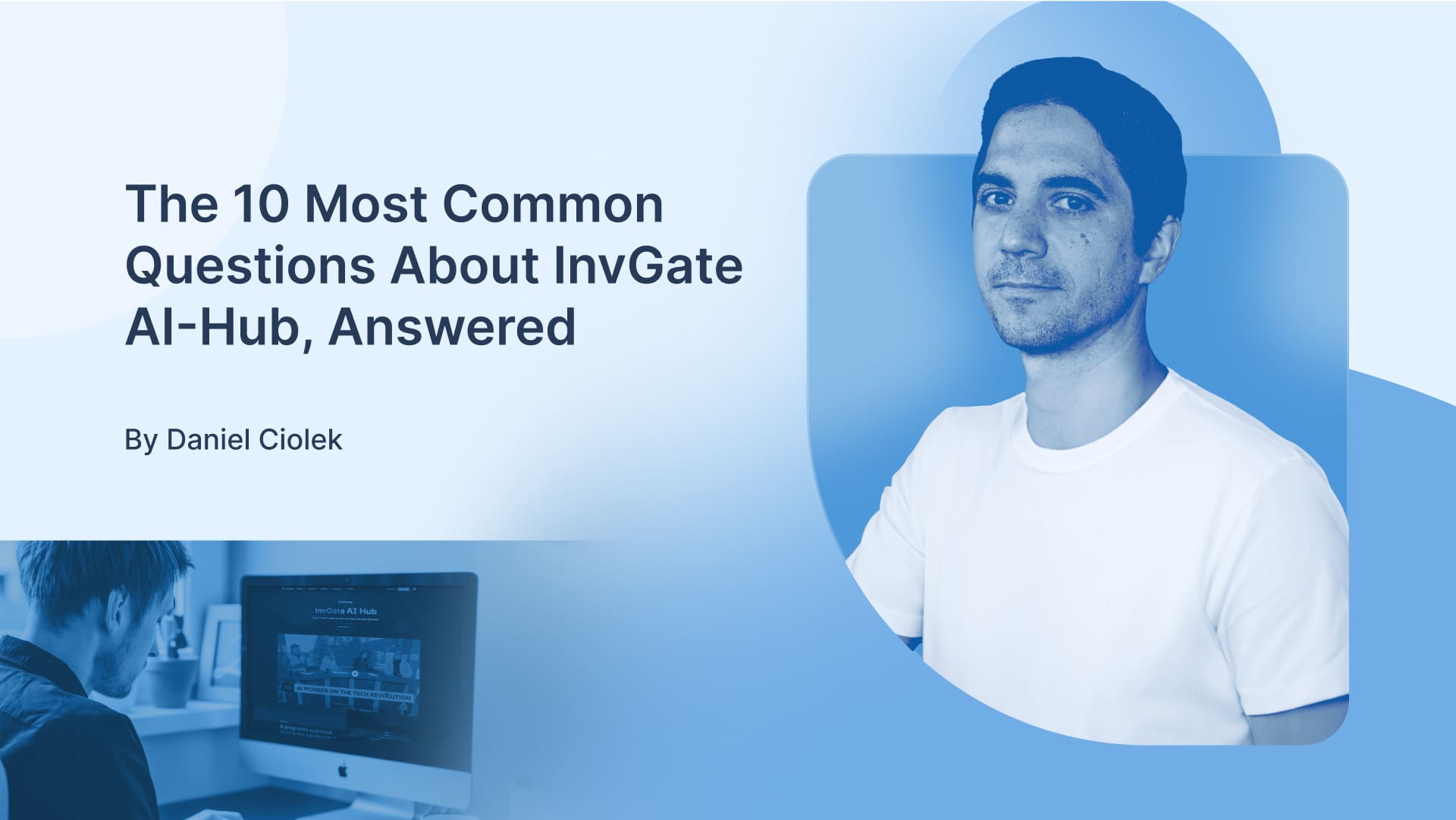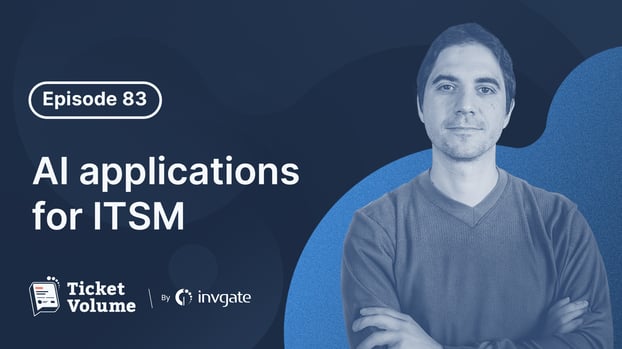Nobody can deny that Artificial Intelligence (AI) has transformed the way we see business, technology, and even our day-to-day lives. Even in the world of IT Service Management (ITSM), its applications are yet to be fully explored and discovered, and its possibilities are unimaginable.
So, let´s see what AI for ITSM looks like at the current moment and where it is going to go from here.
That’s what we talked about in the latest episode of Ticket Volume. We had the pleasure of hosting Daniel Ciolek, a leading expert in AI and the Head of research and development at InvGate.
With a rich background in software development and academics, including a PhD from the University of Buenos Aires, Daniel shared his valuable insights with our host, Matt Beran, on the evolving landscape of AI for ITSM.
Throughout the conversation, Daniel discussed the historical evolution of AI, the game-changing impact of generative AI models, practical applications in ITSM, and strategies for navigating the rapidly evolving AI field.
If you're curious about how AI can transform your IT processes and want to stay ahead of the curve, this episode is a must-listen.
Here are the highlights of episode 83.

The evolution of AI and AI for ITSM
AI is not a new concept. As Daniel pointed out, AI has been around for a long time, with its roots tracing back to the 1950s. The recent surge in interest and application of AI is largely due to the advent of generative AI models like GPT, Gemini, and Claude. These models have brought AI into the mainstream, making it accessible and practical for a wide range of applications.
In fact, at Invigate, we've been using AI models long before the generative AI boom. We utilize classical AI models, such as Expert Systems AI and Machine Learning AI to create algorithms for tasks like software normalization and ticket categorization. These models have proven effective in handling structured data and providing predictions.
Daniel explained that traditional AI models were adept at handling specific tasks where the rules were clearly defined. For instance, decision trees and random forests could be trained to classify tickets based on historical data, allowing for automated sorting and prioritization.
These models, though powerful, required significant effort in terms of feature engineering and rule definition.
Generative AI for ITSM: a game changer
The breakthrough with Generative AI lies in its ability to handle complex problems, especially those related to natural language and computer vision.
As Daniel explained, the wow factor of large language models (LLMs) has made AI more approachable and useful. Unlike traditional AI models that required specialized knowledge to interact with, LLMs provide a natural, conversational interface that anyone can use.
Generative AI models, like GPT (Generative Pre-trained Transformer), have revolutionized the field by enabling machines to understand and generate human-like text.
This has opened up new possibilities for AI applications, particularly in areas like customer support, with AI service desks, content creation, and data analysis. With LLMs, AI can now understand context, generate meaningful responses, and assist in decision-making processes.
Despite the hype with the technology, Daniel believes we are still at the peak of inflated expectations in the AI hype cycle. While AI's potential is immense, it will take time for it to permeate every aspect of business and life fully.
Drawing a parallel with the adoption of Graphical User Interfaces (GUIs), Daniel predicts that AI will eventually become an indispensable part of our daily routines, much like GUIs are today.

Practical Applications of AI
The conversation delved into practical applications of AI for ITSM. Daniel highlighted how Artificial Intelligence can be used to improve response times and the quality of service in IT support.
For instance, InvGate has implemented features that allow agents to respond quickly with high-quality answers, leveraging AI to enhance both speed and accuracy.

One of the standout applications discussed was the use of AI for document privacy. Actually, Daniel and a couple of co-authors wrote a paper on a method to anonymize sensitive information in documents without compromising their utility.
This involves rephrasing sensitive terms while maintaining the document's grammatical structure, a task that was nearly impossible with older techniques. By leveraging AI, organizations can ensure compliance with data privacy regulations while still making use of valuable data.
Another innovative application of AI for ITSM is predictive analytics. By analyzing historical data, AI models can predict future incidents, enabling proactive measures to prevent downtime and improve service reliability.
For example, AI can analyze patterns in ticket data to identify recurring issues and suggest preventive actions. This not only enhances service quality but also reduces the workload on support teams.
Another big one is summarization. Daniel explains it like this:
|
|
"Another feature that's also very common, which is summarization. When you have tickets with a lot of replies, escalations and reasignations, and things go back and forth many times there's no way that you can get up to speed quickly with that. It takes a lot of time. So, clicking a button and having a good summary of what has been happening and what's expected of you is a lifesaver for many." Daniel Ciolek |
Navigating the AI landscape
Staying relevant and not falling behind in AI requires a focus on practical applications and continuous learning. Daniel advised organizations to identify pain points and explore how AI can address them.
It's essential to start small, run pilots, and iterate based on feedback. Being aware of the latest developments and avoiding vendor lock-in are also crucial for long-term success.
From a technical perspective, ensuring data security and privacy and adhering to compliance standards is paramount. Organizations must follow best practices for handling data, including encryption and secure data transfers.
When dealing with AI models, anonymization and data protection measures are vital to maintain privacy while leveraging the power of AI. Daniel emphasized the importance of creating robust data governance frameworks to manage it effectively and ensure compliance with regulations.
Moreover, Daniel stressed the significance of building a skilled team that understands both AI technology and the specific needs of the organization. Investing in training and development is key to keeping the team up-to-date with the latest advancements in AI.
Collaboration between AI experts and domain specialists can drive innovative solutions tailored to the unique challenges of IT Service Management.
Embracing the Future
The interview concluded with a discussion on the future of AI and its impact on various aspects of life and business. Daniel expressed excitement about the potential of AI to solve real-world problems and improve efficiency.
He emphasized the importance of being curious, experimenting with AI applications, and staying adaptable in this dynamic field.
Daniel also touched on the ethical considerations surrounding AI. As AI systems become more prevalent, it's crucial to address issues like bias, transparency, and accountability. Organizations must strive to build ethical AI systems that are fair, explainable, and trustworthy. This involves not only technical measures but also fostering a culture of ethical AI development and usage.
Looking ahead, Daniel envisions a future where AI seamlessly integrates into our daily lives, augmenting human capabilities and driving innovation. He anticipates advancements in areas like natural language processing, computer vision, and autonomous systems. The potential applications of AI are vast, ranging from healthcare and finance to transportation and entertainment.
Conclusion
As AI continues to evolve, it presents both challenges and opportunities. By focusing on practical applications, staying informed, and adhering to best practices, organizations can harness the power of AI to drive innovation and improve their IT Service Management processes.
Daniel's insights serve as a guide for anyone looking to navigate the AI landscape effectively and to learn how AI for ITSM can be valuable. Whether you're just starting with AI or looking to enhance your current capabilities, the lessons from this episode are sure to inspire and inform your journey.
In summary, AI is transforming ITSM in many ways: enabling faster, more accurate responses, enhancing document privacy, predicting future incidents, to name some examples. To stay ahead, organizations must embrace continuous learning, prioritize data security, and foster a culture of ethical AI development.
Tune in for an in-depth discussion and more valuable insights from Daniel Ciolek on leveraging AI in IT service management. You can access the full episode on Apple Podcasts, Spotify, YouTube or your favorite podcasts platform.















